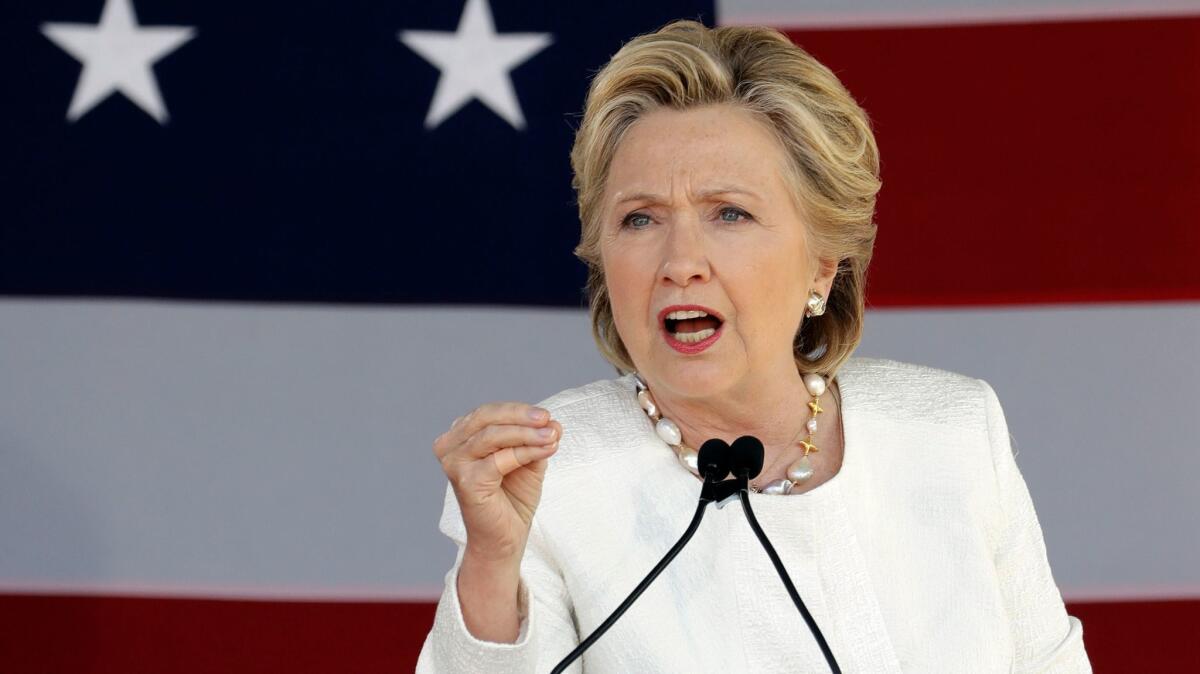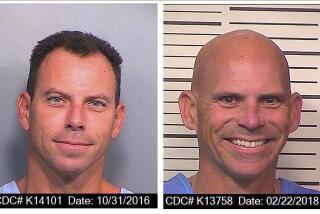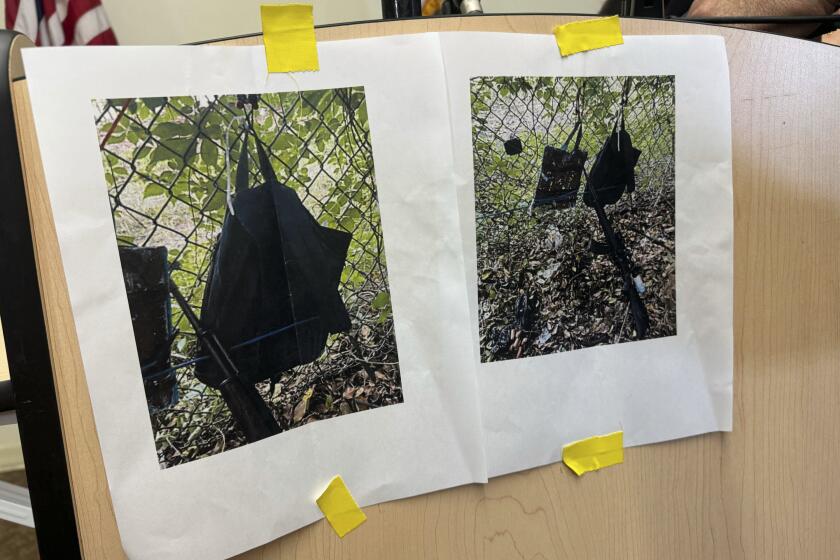Editorial: Even with her email scandals, Hillary Clinton is the only alternative on election day

Almost six week ago we enthusiastically endorsed Hillary Clinton for president, calling her “an experienced, thoughtful and deeply knowledgeable public servant” while warning that Republican opponent Donald Trump was a “thin-skinned demagogue who is unqualified and unsuited to be president.”
Since then, we have been fortified in our opinion by Clinton’s commanding performances in three presidential debates and daily evidence that Trump utterly lacks the ability — or even the attention span — required by the high office he is seeking.
A complete list of the L.A. Times’ 2016 endorsements »
Yet with the election less than a week away, the race remains closer than it should be given the cavernous gap in qualifications between the two nominees. And Clinton has had to cope with not one but multiple “October surprises” that Trump has sought to exploit to his advantage. There has been a steady drip of revelations from emails stolen from a top Clinton aide — apparently by Russian hackers — and posted online by WikiLeaks. Trump, who once called on Russian hackers to dredge up missing Clinton files (he later insisted that he was joking), has said that the stolen emails proved that Clinton was “the vessel for a corrupt global establishment that is raiding our country and surrendering our sovereignty.”
These ‘surprises’ are better described as distractions, and Trump’s assertions to the contrary are self-serving, cynical and disingenuous.
More recently, FBI Director James B. Comey reported to Congress that the bureau had discovered emails “that appear to be pertinent” to its previous investigation of Clinton’s private email server. Comey went public with this information 11 days before the election even though he acknowledged that he couldn’t yet assess “whether or not this material may be significant.” That didn’t stop Trump from insisting that the discovery of additional emails was “bigger than Watergate.”
These “surprises” are better described as distractions, and Trump’s assertions to the contrary are self-serving, cynical and disingenuous.
Yes, the emails stolen from Clinton campaign chair John Podesta contain some legitimately embarrassing information, including evidence of an overlap between the Clinton Foundation and a firm that arranged speaking fees for former President Bill Clinton. But while the peek behind the Clinton campaign curtain may have titillated political junkies, the revelations don’t support Trump’s histrionic suggestion that the State Department under Hillary Clinton was ethically compromised, let alone that she was running the department as an outpost of a “corrupt global establishment.” (That said, as we have urged before, it would be wise for all members of the Clinton family to sever ties with the foundation if Hillary Clinton is elected president.)
As for the other October surprise, Comey rightly is being criticized — including by former U.S. attorneys general from both parties — for publicly announcing that the FBI would be examining emails that “appear to be pertinent” to an investigation of Clinton’s use of a private email server. That investigation had ended this summer with Comey’s recommendation that no charges be filed. It was irresponsible for Comey to offer such a vague yet politically charged statement. Someone as wise in the ways of Washington as Comey, a former deputy attorney general, should have realized that his letter to Congress would be manipulated by Republicans for partisan advantage.
It’s also troubling that Comey reportedly ignored the advice of senior Justice Department officials that he not inform Congress of the investigation (and baffling why his superiors didn’t order him not to do so unless and until the FBI knew the emails were consequential). As former Atty. Gen. Eric H. Holder Jr. and many others have noted, Comey’s action violated two fundamental principles: that the Justice Department doesn’t comment about ongoing investigations and that it doesn’t take unnecessary action close to election day that might affect an election’s outcome.
This week the Justice Department informed Congress that it would “continue to work closely with the FBI and together, dedicate all necessary resources and take appropriate steps as expeditiously as possible” to review the emails found on a computer belonging to former Rep. Anthony Weiner, the estranged husband of Clinton aide Huma Abedin. But it seems unlikely that the work can be completed before next Tuesday’s election. So how should voters factor this development into their decision?
They shouldn’t. Contrary to what Trump suggested, there is no reason to assume that any official emails found on Weiner’s computer will contradict the FBI’s earlier finding that Clinton’s use of a private server, while careless, didn’t violate laws against the mishandling of classified information. But even if a voter harbored doubts on that score, they can’t justify a vote for Trump. There is no comparison between Clinton’s carelessness in corresponding with colleagues and the recklessness that Trump would bring to the conduct of actual foreign policy. And that is only one of a multitude of differences between the two nominees.
A victory for Trump on Tuesday wouldn’t just be a November surprise; it would be a national disaster.
Follow the Opinion section on Twitter @latimesopinion and Facebook
ALSO
The somewhat independent FBI director
Should you pick a fight with your relatives over the election?
You’re probably tired of the presidential race, but long campaigns are a good thing
More to Read
A cure for the common opinion
Get thought-provoking perspectives with our weekly newsletter.
You may occasionally receive promotional content from the Los Angeles Times.










